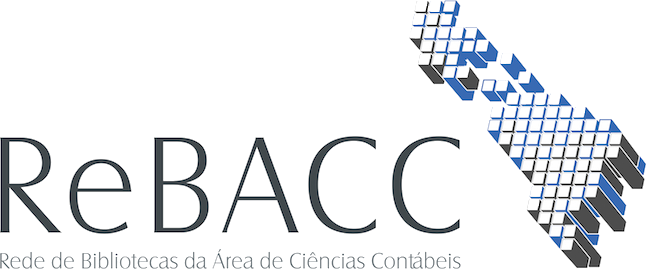Use este identificador para citar ou linkar para este item:
http://rebacc.crcrj.org.br/handle/123456789/5422Registro completo de metadados
| Campo DC | Valor | Idioma |
|---|---|---|
| dc.creator | Antunes, Maria Thereza Pompa | - |
| dc.creator | Martins, Eliseu | - |
| dc.date | 2002-08-01 | - |
| dc.date.accessioned | 2020-08-13T16:00:15Z | - |
| dc.date.available | 2020-08-13T16:00:15Z | - |
| dc.identifier | https://www.revistas.usp.br/rcf/article/view/34073 | - |
| dc.identifier | 10.1590/S1519-70772002000200003 | - |
| dc.identifier.uri | http://rebacc.crcrj.org.br/handle/123456789/5422 | - |
| dc.description | Muito se tem comentado que os relatórios fornecidos pela Contabilidade Financeira não retratam certas realidades das empresas atualmente, tendo em vista o fato de o valor contábil das ações estar muitas vezes abaixo do seu valor de mercado. Esse contraste entre os dois valores vem sendo identificado como Capital Intelectual e apresentado como um novo conceito de administração de empresas que conduz à necessidade de aplicação de novas estratégias, de nova filosofia de gestão e novas formas de avaliação do valor da empresa. Este trabalho evidencia a verdadeira relação existente entre a Contabilidade e o Capital Intelectual. Desmistifica-se a novidade do conceito, pois comprova-se que o capital Intelectual é parte integrante do Goodwill, conceito secularmente conhecido e estudado pela Contabilidade. Os elementos intangíveis sempre foram abordados pela Contabilidade e, da mesma forma, como nunca se desprezou a sua importância, nunca se subestimou a sua complexidade. Portanto, a Contabilidade não é falha na divulgação das informações por ela registradas. Deve-se entender a finalidade de cada uma das Demonstrações Contábeis, bem como os Princípios subjacentes a elas. A falta de conhecimento, por vezes, conduz a conclusões precipitadas e errôneas. Por outro lado, qualquer que seja o rótulo atribuído aos elementos intangíveis, que sempre fizeram parte das organizações, entende-se e aceita-se que hoje, cada vez mais, o conhecimento e o gerenciamento desses elementos são relevantes para a gestão das empresas, pois o momento atual é caracterizado pela ampla aplicação do recurso do conhecimento pelo homem, que se materializa em novas tecnologias, sistemas e serviços (entendidos como ativos intangíveis) que agregam valor às organizações. | - |
| dc.description | It has been said many times that the statements provided by Financial Accounting do not give a picture of certain realities of companies nowadays, considering the fact that, often, the accounting value of shares is below their market value.This contrast between the two values is being identified as Intellectual Capital and presented as a new concept of business administration that leads to the necessity of applying new strategies, a new management philosophy and new ways of company valuation. This article demonstrates the relation that actually exists between Accountancy and Intellectual Capital. The novelty of the concept is demystified since it is proven that Intellectual Capital constitutes a component part of Goodwill , a concept that has been known and studied by Accountancy for ages.The intangible elements have always been dealt with by Accountancy and, in the same way as their importance has never been disregarded, their complexity has never been underestimated. Therefore, Accountancy is not defective in its publication of the information it registers.The purpose of each of the Financial Statements must be understood, as well as the Principles on which they are built. Sometimes, the lack of knowledge leads to precipitated and erroneous conclusions. On the other hand, whichever the label attributed to the intangible elements, which have always been a part of organizations, it is understood and accepted that, nowadays, the knowledge about and administration of these elements are more and more relevant for company management, since the current time is characterized by the widespread application of the knowledge resource by man, which is materialized into new technologies, systems and services (understood as intangible assets) that add value to the organizations. | - |
| dc.format | application/pdf | - |
| dc.language | por | - |
| dc.publisher | Universidade de São Paulo. Faculdade de Economia, Administração e Contabilidade | - |
| dc.relation | https://www.revistas.usp.br/rcf/article/view/34073/36805 | - |
| dc.rights | Copyright (c) 2018 Revista Contabilidade & Finanças | - |
| dc.rights | http://creativecommons.org/licenses/by/4.0 | - |
| dc.source | Revista Contabilidade & Finanças; v. 13 n. 29 (2002); 41-54 | - |
| dc.source | Revista Contabilidade & Finanças; Vol 13 No 29 (2002); 41-54 | - |
| dc.source | Revista Contabilidade & Finanças; Vol. 13 Núm. 29 (2002); 41-54 | - |
| dc.source | 1808-057X | - |
| dc.source | 1519-7077 | - |
| dc.subject | Intellectual Capital; Goodwill; Intangible Assets; Knowledge Society | - |
| dc.subject | Capital Intelectual; Goodwill; Ativos Intangíveis; Sociedade do Conhecimento | - |
| dc.title | Capital intelectual: verdades e mitos | - |
| dc.type | info:eu-repo/semantics/article | - |
| dc.type | info:eu-repo/semantics/publishedVersion | - |
| Aparece nas coleções: | Revista Contabilidade & Finanças - USP | |
Arquivos associados a este item:
Não existem arquivos associados a este item.
Os itens no repositório estão protegidos por copyright, com todos os direitos reservados, salvo quando é indicado o contrário.

